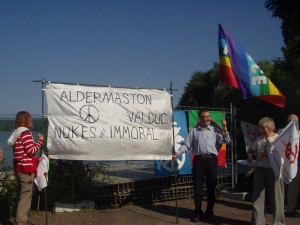Being an engineer, not a moral philosopher, I think of morality as mostly about standards, the standards by which we contrive to live together in a civilised way. But most people would agree that it also includes some basic autonomous principles, as for example, ‘You shall not kill’, which apply in principle for everyone, for all time.
This principle is sometimes difficult to apply, but is nevertheless fundamental in a way that most other rules are not. And it could be said to arise, not from a prohibition, but from a more positive idea of love of, and connection with, our fellow human beings. We find that the humanitarian impulse is in our nature and so for example, human tragedies, anywhere in the world, cause us deep concern.
So morality, as we know it, may be only a codification of deeper and more complex principles, but it is a vital summarisation on which we base our everyday life. And ethics is moral philosophy. There being so much written about it, over two or three thousand years, how can I presume to helpfully explain it to you, in ten minutes? Simply by introducing you to a tool, designed to help in the application of ethics in this one complex case – nuclear weapons.
The application of ethics in the real world is subject to many difficulties and distortions and the sheer complexity of the problems that we try to resolve. But judging things for ourselves we look for the nub of the problem, the simple key question that we think we can answer. This is the approach applied by very many people. Good, honest, very busy people. But different people ask themselves different questions and naturally come to different answers. It is not really good enough.
Here, you will be taking decisions on nuclear weapons, that relate to the stability and safety of the world, for a long time to come. It would be foolish to go forward without at least applying the moral principles that we normally live by. Are nuclear weapons so different that our usual moral principles do not apply? No.
Are our judgements in this field consistent with the principles that we do apply in the rest of our life? I think they are often quite different.
Have we considered the whole problem? Or are we focussed on just one or two aspects, like the man-in-the-street who, all too often, has for his ready answer: “North Korea”, or the “expert” that you can call upon, who cites our “vital strategic interest” as if it really was an answer? This is too simplistic, we owe it to ourselves and our children (and the rest of the world) to really test such a momentous decision.
The tool we are proposing here, to help you tackle this critical issue, is the Nuclear Morality Flowchart. Here are all the essential questions, in the right order, in a logical network. It is simply a decision tree. You have to make the decisions. For you, for your individual conscience, it is an ethical algorithm. That is, it will enable you to arrive at the right answer for you. You simply start at Question 1 and answer the questions according to the knowledge and moral principles that you own. It may not bring you to an answer that you like. Then you may walk away muttering about vital strategic interest, or maybe you will look hard for honest ways to adjust the logic. That’s fair enough, if you’re prepared to put up for examination your alternative, and equally rigourous plan. But that’s the challenge.
This issue is a challenge for everyone; we all may have to adjust our ideas. It’s about deciding whether we should engineer the means to incinerate perhaps millions of people – it’s certainly a moral issue and everyone has a moral stake in it, not only the decision makers. So we hope and pray (some of us really do) that our decision makers will come to a right judgement. That is why I commend this to you. I beg you to use this chart as an aid to an informed, rational moral decision.
And in fact we require of our decision makers that their decision process is openly rational, logical, and moral. How could we achieve this? Simply by asking them to indicate their moral decision path on the ethical flowchart. http://nuclearmorality.com/ It is that easy – the software is organised for you to select your answers to the moral and practical questions on-screen and communicate the solution to your electors. Or you can use a highlighter pen on the hard copy.
Let’s look briefly at how the flowchart works. Firstly we limit the scope to morality of nuclear deterrence. Then we configure all the questions to have simple yes/no answers. We distinguish between moral questions and the various practical questions which are essential to the logic. We start with the basic moral statement: “You shall not kill”, appended by a question mark. Then, whichever way you go from there, you have to examine the moral implications of practical situations. Everyone, on both sides of the argument, has quite hard questions to answer.
Where does it lead us?
You can see there are three routes out of the chart. What do they mean for the coming debate?
- These people here have to renounce the nuclear deterrent. You could say they are unilateralists. I don’t like that word, because in practice they will work for multilateral disarmament along with these people here. (Don’t be misled by this, false dichotomy between unilateral and multilateral steps to disarmament.)
- These people come to a positive, practical rejection of nuclear deterrence. For various reasons they cannot accept nuclear deterrence as a long-term solution. Many of them may wish to hold off from renewal of Trident, while building a treaty to ban nuclear weapons. Probably some of them will vote to go ahead with renewal while still taking positive steps towards multilateral disarmament.
- These people will probably vote to go ahead with renewing Trident and take a rather hard line on disarmament. They will be happy for the UK to continue to ignore the pleas of most of the world (139 governments and numerous recent UN resolutions) asking us to collaborate with the efforts to develop a practical treaty, one which could ultimately incorporate a process, not merely an intention, for disarmament.
- And none of us, should forget that the world is watching us.
This issue is challenging for all of us. The prospect of having to change our ideas is unsettling. For you legislators the responsibility of making the right moral judgement makes it even more challenging. And it is understandable that many in your position will fall back on ‘accepted wisdom’. But what is at stake, the consequences in this particular issue, call into urgent question the conventional mindset. We suggest this process as a means to encourage and enable you to think afresh.
You have a track record here: Just over 200 years ago, this parliament, and eventually the rest of the world, voted to make the Slave Trade illegal. The arguments were often about economics and politics and even national security, but the driving force was the moral issue and that is what is remembered today – the slave trade and ultimately slavery itself, became universally unacceptable, morally abhorrent “repugnant to the principles of natural justice”. That is why we, and humanity as a whole, can never collectively go back to it. Our hope is that by making clear moral judgements this parliament will begin to do the same for nuclear weapons.
Martin Birdseye 18/4/2016


